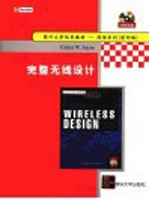图书介绍
完整无线设计2025|PDF|Epub|mobi|kindle电子书版本百度云盘下载

- (美)塞杰(Sagre,C.W.)著 著
- 出版社: 北京:清华大学出版社
- ISBN:7302102864
- 出版时间:2004
- 标注页数:547页
- 文件大小:21MB
- 文件页数:562页
- 主题词:无线电通信-高等学校-教材-英文
PDF下载
下载说明
完整无线设计PDF格式电子书版下载
下载的文件为RAR压缩包。需要使用解压软件进行解压得到PDF格式图书。建议使用BT下载工具Free Download Manager进行下载,简称FDM(免费,没有广告,支持多平台)。本站资源全部打包为BT种子。所以需要使用专业的BT下载软件进行下载。如BitComet qBittorrent uTorrent等BT下载工具。迅雷目前由于本站不是热门资源。不推荐使用!后期资源热门了。安装了迅雷也可以迅雷进行下载!
(文件页数 要大于 标注页数,上中下等多册电子书除外)
注意:本站所有压缩包均有解压码: 点击下载压缩包解压工具
图书目录
Chapter 1.Wireless Essentials1
1.1 Passive Components at RF1
1.1.1 Introduction1
1.1.2 Resistors2
1.1.3 Capacitors2
1.1.4 Inductors4
1.1.5 Transformers7
1.2.3 Transistors 17
1.2 Semiconductors9
1.2.1 Introduction9
1.2.2 Diodes10
Contents11
Preface11
1.3.1 Introduction26
1.3 Microstrip26
1.3.2 Microstrip as Transmission Line27
1.3.3 Microstrip as Equivalent Components28
1.4 Transmission Lines38
1.4.1 Introduction38
1.4.2 Transmission Line Types38
1.4.3 Transmission Line Issues39
1.5 S-Parameters39
1.5.1 Introduction39
1.5.2 S-Parameter Measurement43
1.6 Propagation48
1.6.1 Introduction48
1.6.2 Multipath48
2.1.2 Fundamentals51
2.1.1 Introduction51
2.1 Amplitude Modulation51
Chapter 2.Modulation51
2.1.3 Power Measurement56
2.1.4 Disadvantages57
2.2 Frequency Modulation57
2.2.1 Introduction57
2.2.2 Fundamentals57
2.2.3 FM and AM Comparisons62
2.3 Single-Sideband Modulation62
2.3.1 Introduction62
2.3.2 Fundamentals63
2.3.3 Modulation64
2.3.4 Output Power65
2.4.2 Types of Digital Modulation66
2.4.1 Introduction66
2.4 Digital Modulation66
2.4.3 Power and Digital Signals70
2.4.4 Digital Modulation Issues72
2.5 Designing with Modulator/Demodulator l.C.s81
2.5.1 Introduction81
2.5.2 Designing with the RFMD RF270383
2.6 Digital Test and Measurement86
2.6.1 Introduction86
2.6.2 Common Digital Tests and Measurements87
Chapter 3. Amplifier Design99
3.1 Small Signal Amplifiers111
3.1.1 Introduction111
3.1.2 Amplifier Design with S-Parameters112
3.1.3 Vector Algebra121
3.1.4 Matching Networks126
3.2 Large Signal Amplifiers151
3.2.1 Introduction151
3.2.2 Amplifier Design with Large Signal Series Equivalent Impedances155
3.3 Amplifier Biasing158
3.3.1 Introduction158
3.3.2 Bias Designs173
3.4 MMICs187
3.4.1 Introduction187
3.4.2 MMIC Biasing188
3.4.3 MMIC Coupling and Decoupling191
3.4.4 An MMIC Amplifier Circuit192
3.4.5 MMIC Layout193
3.5.1 Introduction194
3.5 Wideband Amplifier194
3.5.2 Design of Wideband Amplifiers198
3.6 Parallel Amplifier199
3.6.1 Introduction199
3.6.2 Design of a Parallel MMIC Amplifier201
3.7 Audio Amplifiers202
3.7.1 Introduction202
3.7.2 Design of an IC Audio Amplifier203
3.8 VGA Amplifiers204
3.8.1 Introduction204
3.8.2 Design of VGA Amplifiers204
3.9 Coupling/Decoupling of Amplifiers206
3.9.1 Introduction206
3.9.2 Design of Decoupling/Coupling Circuits207
Chapter 4.Oscillator Design213
4.1 Oscillator Simulation216
4.1.1 Introduction216
4.1.2 Open-Loop Design216
4.2 VCO and LC OsciIlators224
4.2.1 Introduction224
4.2.2 Types of LC Oscillators224
4.2.3 Designing LC Oscillators and VCOs227
4.2.4 Testing LC Oscillators236
4.2.5 LC and VCO Oscillator Issues236
4.3 Crystal Oscillators240
4.3.1 Introduction240
4.3.2 Types of Crystal Oscillators242
4.3.3 Designing Crystal Oscillators244
4.3.4 Crystal Oscillator Issues249
4.3.5 Testing and Optimizing Crystal Oscillators251
Chapter 5.Frequency Synthesizer Design253
5.1 Phase-Locked Loops253
5.1.1 Introduction253
5.1.2 Designing Phase-Locked Loops258
5.2 Direct Digital Synthesis266
Chapter 6.Filter Design271
6.1 Lumped Filters278
6.1.1 Introduction278
6.1.2 Types of Lumped Filters279
6.1.3 Image-Parameter Design280
6.2 Distributed Filters290
6.2.1 Introduction290
6.2.2 Types of Distributed Filters292
6.2.3 Distributed Filter Design293
6.2.4 Distributed Filter Issues298
6.3 Diplexer Filters299
6.3.1 Introduction299
6.3.2 Diplexer Design300
6.4 Crystal and SAW Filters301
6.4.1 Introduction301
6.4.2 Crystal and SAW Filter Issues302
6.5 Active Filters304
6.5.1 Introduction304
6.5.2 Active Filter Design305
6.6 Tunable Filters307
6.6.1 Introduction307
6.6.2 Tunable Filter Design307
Chapter 7.Mixer Design313
7.1 Passive Mixers314
7.1.1 Introduction314
7.1.2 Types of Passive Mixers315
7.1.3 Passive Mixer Design317
7.1.4 Passive Mixer Issues319
7.2 Active Mixers324
7.2.1 Introduction324
7.2.2 Types of Active Mixers324
7.2.3 Designing Active Mixers327
7.2.4 Active Mixer Issues331
Chapter 8.Support Circuit Design333
8.1 Frequency Multipliers333
8.1.1 Introduction333
8.1.2 Frequency Multiplier Design337
8.1.3 Frequency Multiplier Issues340
8.2 RF Switches342
8.2.1 Introduction342
8.2.2 RF Switch Design343
8.2.3 RF Switch lssues348
8.3 Automatic Gain ControI349
8.3.1 Introduction349
8.3.2 Automatic Gain Control Design351
8.3.3 Automatic Gain Control Issues356
8.4 Attenuators357
8.4.1 Introduction357
8.4.2 Fixed Attenuator Design357
8.4.3 Variable-Attenuator Design358
8.5.1 Introduction360
8.5 Baluns360
8.5.2 Balun Design361
8.6 Splitters/Combiners362
8.6.1 Introduction362
8.6.2 Splitter and Combiner Design362
8.7 Power Supplies365
8.7.1 Introduction365
8.7.2 Types of Power Supply Regulators370
8.7.3 Regulator Design373
8.8 Directional Couplers377
8.8.1 Introduction377
8.8.2 Directional Coupler Design378
Chapter 9.Communication Systems Design379
9.1 Receivers379
9.1.1 Introduction379
9.1.2 Receiver Design380
9.1.3 Receiver Issues388
9.2 Transmitters389
9.2.1 Introduction389
9.2.2 Transmitter Design390
9.3 Link Budgets393
9.3.1 Introduction393
9.3.2 Link Budget Design394
9.3.3 Will It Work?397
9.4 The Complete System401
9.4.1 Introduction401
9.4.2 Wireless System Design401
9.4.3 System Design with RFICs406
9.4.4 System Issues409
10.1 Noise in Components and Systems413
Chapter 10.Wireless lssues413
10.2 Electromagnetic Interference414
10.2.1 Introduction414
10.2.2 Designing for EMI Suppression414
10.3 Wireless Board Design417
10.3.1 Introduction417
10.3.2 Board Materials417
10.3.3 Board Layout419
10.3.4 Board Design Issues425
10.4 Software Radio429
10.4.1 Introduction429
10.4.2 Software Radio Designs429
10.5 Hybrid Circuits431
10.5.1 Introduction431
10.5.2 Board and Conductor Materials432
10.6.1 Introduction433
10.6 Direct-Conversion Receivers433
10.6.2 Direct-Conversion lssues434
10.7 Prototyping435
10.7.1 IntroduCtion435
10.7.2 Prototyping Considerations435
10.8 Antennas436
10.8.1 Introduction436
10.8.2 Common Antenna Types439
10.8.3 Antenna Issues441
10.9 RF Connectors442
10.9.1 Introduction442
10.9.2 Types of RF Connectors442
10.10.2 RF Programs443
10.10 Wireless Design Software443
10.10.1 Introduction443
10.10.3 RF Software Issues445
10.11 FCC Equipment Autho rizations448
10.11.1 Introduction449
10.11.2 Wireless Equipment Law449
10.12 Support Circuits449
10.12.1 Introduction451
10.12.2 Circuits451
Appendix A.Puff Manual459
Appendix B.Useful Tables519
Glossary523
Bibliography539
Index543
热门推荐
- 3705616.html
- 2657700.html
- 122954.html
- 1710556.html
- 3774064.html
- 1625478.html
- 3443672.html
- 2509003.html
- 1673650.html
- 777533.html
- http://www.ickdjs.cc/book_1305571.html
- http://www.ickdjs.cc/book_3557874.html
- http://www.ickdjs.cc/book_2931578.html
- http://www.ickdjs.cc/book_31762.html
- http://www.ickdjs.cc/book_3232634.html
- http://www.ickdjs.cc/book_2011802.html
- http://www.ickdjs.cc/book_2643250.html
- http://www.ickdjs.cc/book_3213602.html
- http://www.ickdjs.cc/book_3659197.html
- http://www.ickdjs.cc/book_1722862.html